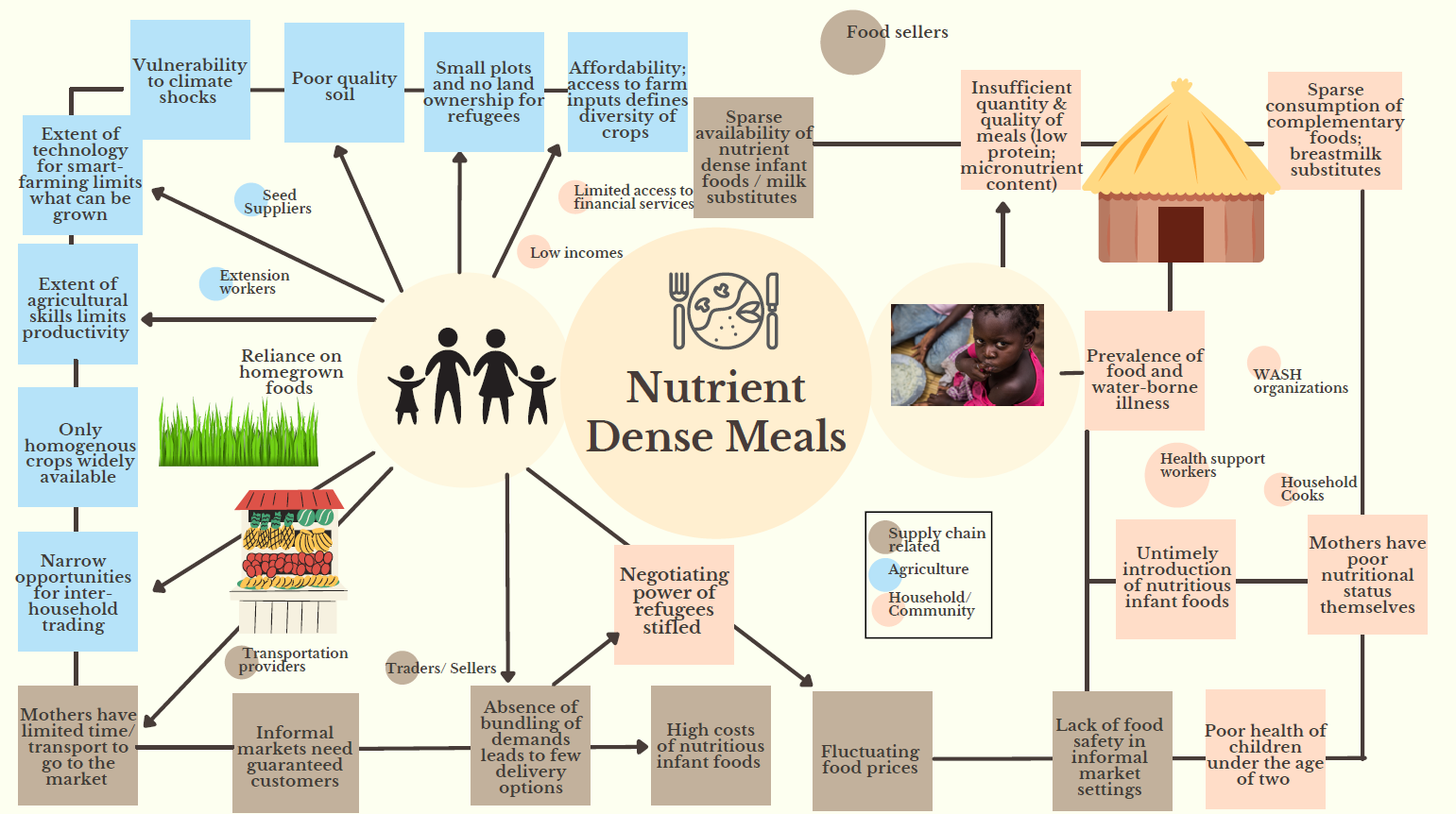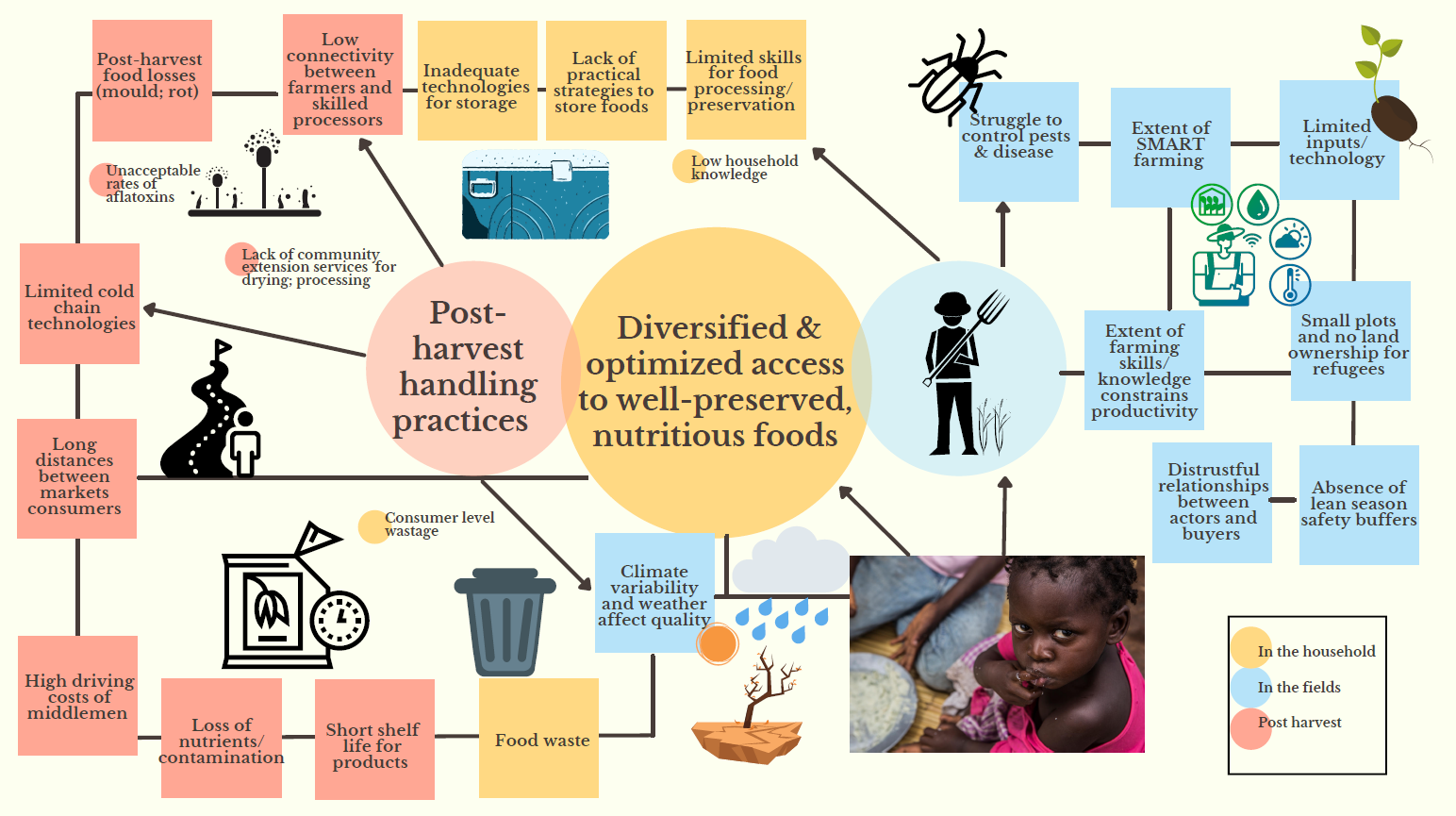Local Innovation for Nutrition Solutions Project
Meet the winners of the nutrion innovation challenge fund
Overview
Addressing food security and malnutrition are priorities within the African Union development agendas in Africa, and is specifically in line with the Uganda Nutrition Action Plan that calls for coordinated response from a wide group of actors to address the country’s nutrition issues towards attaining the Sustainable Development Goals. The consequences of malnutrition include morbidity and mortality issues, increased infectious disease burden, and more susceptibility to disease. In addition, children affected by malnutrition during their early life (from conception to 2 years), also face long-term impact on their socio-economic perspective due to poor childhood developmental and cognitive outcomes. Uganda has made some improvements but like the rest of the continent, needs to strengthen efforts to achieve food security and nutrition targets of SDG2 to end hunger, food insecurity and all forms of malnutrition by 2030. In particular, the pace of reduction of chronic malnutrition has been slow.
The limitations of the current humanitarian response: Although there are effective and proven ways to respond to chronic and acute malnutrition, some of the major limitations include:
- Reliance on distribution of free and imported nutritious foods (corn-soya blend/porridge) to at risk households
- Reliance on humanitarian funding to enable this type of intervention
- Reduction of funding flows to Uganda (UNHCR data as of 31 March 2022 shows that interagency partners report receipt of only USD 41 million against the Country Refugee Response Plan, covering 5 percent of the total USD 804 million funding needs for 2022.) and most recently increasing food prices due to the conflict in Ukraine.
The Humanitarian Innovation Programme of Innovation Norway, proposes to support humanitarian organization in responding to such challenges by designing and testing interventions that may optimize the use of market forces and engage private sector, i.e. transforming traditional delivery of aid.
The selection process followed during the innovation challenge fund
Family meal time in Bidibidi refugee settlement, West Nile, Uganda, 2017 - c/Save the Children Uganda
Local Innovation for Nutrition Solutions Project (LINS) is a project implemented by the Response Innovation Lab (RIL) Uganda in partnership with Save the Children with financial support of Innovation Norway.It runs since November 2021 and until the beginning of 2023.
The LINS project aims to find and test viable business models to enable the sustainable demand of local nutritious foods in refugee-hosting communities in Uganda. The goal of LINS is to address underlying determinants of malnutrition in refugee children living in Kyaka II and Rhino refugee settlements and surrounding host communities through the analysis and testing of appropriate small-scale solutions and practices developed through a human-centered design process.
In 2021, LINS issued a call for nutrition innovations/solutions that are locally rooted, market-driven, sustainable, with satisfactory proof of concept and less dependent on humanitarian aid flows. The call sought to support quality solutions to at least one of the major challenges of malnutrition revolving around positive behavioral change practices, access to nutritious food and prevention of food loss and wastage along the food system.
Five innovation pilots by startups, non-profit and academic organizations are currently ongoing in Rhino camp, West Nile and Kyaka II, Kyegegwa. The total number of direct beneficiaries planned to be reached by the pilots in both locations is about 400.
See short video on the selected innovation Pilots
The nutrition Innovation Challenge Fund(Closed)
The Nutrition Innovation Challenge fund represented an investment of about USD 250,000 in quality solutions to at least one of the major challenges of malnutrition revolving around positive behavioural change practices, access to nutritious food and prevention of food loss and wastage along the food system.
The selection exercise to identify the best innovations was conducted through various expert reviews and the LINS team is in partnership with a mix of startups, NGOs and academic organizations to run pilots in Kyaka II & Rhino Camp Refugee settlements. These will receive funding, technical support and linkages to the humanitarian and innovation ecosystems.
MEET THE WINNERS OF THE NUTRITION INNOVATION CHALLENGE FUND
Vertical & Micro Gardening (Startup): https://vmg.verticalandmicrogardening.org/
Provision of technical trainings on better vertical farming practices for both Rhino camp & Kyaka II Refugee settlement through a vertical farms and micro greens project.
Welthungerhilfe and CEFORD (International & national NGO): https://www.welthungerhilfe.org/ & http://www.ceford.or.ug/
Solar drying project to promote dietary diversity in Rhino Camp Refugee Settlement through increased accessibility of fruits and vegetables throughout the year.
Afema Ventures (private sector): https://afema.co.ug/
The project will support creation and scale up of sustainable and inclusive poultry micro-enterprises through provision of facilities for vaccination, improved access to feeds, and trainings.
Gulu University (Academia): https://gu.ac.ug/
A product innovation in Rhino Camp Refugee settlement to test the acceptability of a nutrient dense composite flour (soy, orange-flesh sweet-potato, millet, sesame). Project participants will be trained on production and processing in addition to market linkages for sustainability.
Group pictures with the selected LINS innovators and key nutrition stakeholders during the Launch event in Kampala
Support offered during concept development
The Local Innovations for Nutrition Solutions proposed a range of resources (readings and interactive activities) to support in the preparation of applications. None of these activities were mandatory to be able to submit an expression of interest but they were strongly recommended.
The potential applicants benefited from:
Information sharing and discussing their ideas with various sector experts
Introduction to and linkages with various nutrition ecosystem stakeholders who may be valuable implementing partners
Access to sector specific data and information that can guide and facilitate the development of compelling concept notes.
All the resources to prepare for the Nutrition Innovation Challenge Fund
>>> Recordings of info session of 1 & 2 December
>>> Slides of Info Session of 1 & 2 December
>>> FAQ (updated weekly)
>>> Matchmaking session of 8 December
Demonstration vertical Farms at Ocea Health Center 3 in Rhino camp
Dried fruits and vegetables produced using solar driers
Vaccination of Poultry by Afema Ventures Para vets in Rhino camp
Training on packaging of OFMISESO composite flour by Gulu University
LAUNCH OF THE SELECTED PILOT PROJECTS
The LINS team officially introduced the project and selected innovators to key stakeholders and partners on 21st July 2022 at Fairway Hotel in Kampala. https://www.newvision.co.ug/category/news/local-startups-win-sh950m-to-boost-food-secur-139299
Inception meetings
Selected pilot projects were officially introduced to stake holders in Rhino Camp and Kyaka II refugee settlements on 4th and 11th August 2022 respectively.
Recording of info session of 12 January 2022 (application template)
Any other questions or ideas for collaboration contact: lins@responseinnovationlab.com
Archive (2021)
Listen to and read more about LINS:
>>> Click for a one-page description
Info Session of the 26 March:
Recording of Info Session 1













